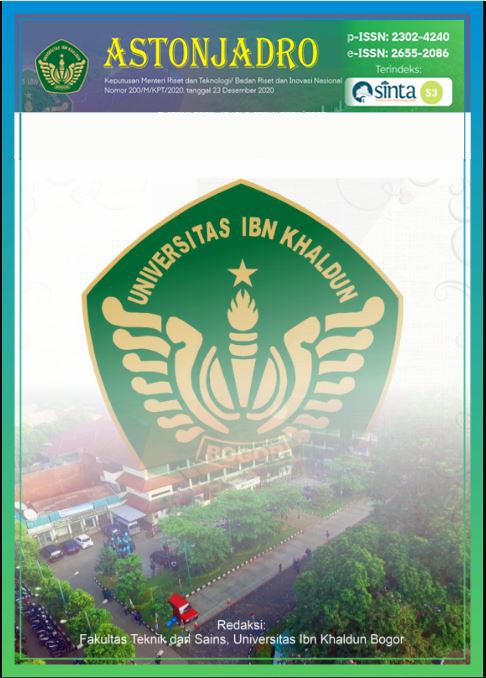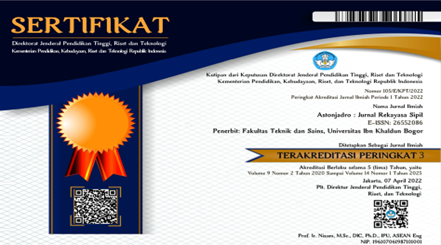Logistic Regression Application in Determining Mode Selection Factors of Musi Emas Feeder Transport, Palembang City
DOI:
https://doi.org/10.32832/astonjadro.v12i3.14197Abstract
Mode of transportation is absolutely a basic human need, especially in urban areas which tend to have high mobility. One type of mode that an important role in the urban transportation system is public transportation. oday, public transportation continues to make updates, one of which is public transportation in Palembang City marked by the start of operation of the Musi Emas feeder city transport in July 2022 with 7 routes. This study aims to identify the factors that influence and become the parameters of the traveling community in choosing mode of Musi Emas feeder city transportation Palembang City on the route corridor 1 Talang Kelapa – Punti Kayu, and corridor 2 Asrama Haji – Sematang Borang. The research approach used was quantitative with primary data sources from a revealed preference survey of 208 respondents who had used the Musi Emas feeder transport, and 192 respondents who had never used it. Analysis of the results of the survey data was modeled by logistic regression in order to look for factors that have an influence on choosing the mode of transportation of the Musi Emas feeder. The results of the analysis show that the independent variable data has a significant effect on variable dependent and the results of logistic regression analysis showed variable gender, age, and travel costs are influential variables in determining the choice of travelers to use the Musi Emas feeder city transportation mode.
References
Al-Salih, W. Q., & Esztergár-Kiss, D. (2021). Linking mode choice with travel behavior by using logit model based on utility function. Sustainability (Switzerland), 13(8). https://doi.org/10.3390/su13084332
Arreeras, T., Chongutsah, S., Asada, T., & Arimura, M. (2020). Factors Affecting Mode Choice in Accessing Railway Station Study in Nakhon Ratchasima. Transportation Research Procedia, 48(2019), 3457–3468. https://doi.org/10.1016/j.trpro.2020.08.107
Bhat, C. R., & Koppelman, F. S. (1999). Activity Based Modeling of Travel Demand. In Handbook of Transportation Science (pp. 35–61). Springer Science+Business Media New York.
Binder, R. B., Lancaster, Z., Tobey, M., Jittrapirom, P., & Yamagata, Y. (2019). Transport modeling with a purpose: How urban systems design can bridge the gaps between modeling, planning, and design. WIT Transactions on the Built Environment, 186, 85–96. https://doi.org/10.2495/UT190081
Binovan, F. I., E. Simangunsong, J., & Rahman, T. (2022). Evaluasi Kinerja Operasional Dan Pelayanan Pada Angkutan Kota (Angkot) Trayek F Kota Samarinda. Teknologi Sipil : Jurnal Ilmu Pengetahuan Dan Teknologi, 6(2), 52–60. https://doi.org/10.30872/ts.v6i2.9412
Borkowski, P., Jażdżewska-Gutta, M., & Szmelter-Jarosz, A. (2021). Lockdowned: Everyday mobility changes in response to COVID-19. Journal of Transport Geography, 90(May 2020). https://doi.org/10.1016/j.jtrangeo.2020.102906
Bowman, J. L., & Ben-Akiva, M. E. (2001). Activity-based disaggregate travel demand model system with activity schedules. Transportation Research Part A: Policy and Practice, 35(1), 1–28. https://doi.org/10.1016/S0965-8564(99)00043-9
Buamona, M. S., Timboeleng, J., & Karangkog, H. (2017). Analisis Pelayanan Transportasi Angkutan Kota di Kota Ternate. Universitas Sam Ratulangi Manado, 82–95.
Devi, M. K., Safitri, R., & Fanani, F. (2021). Peran Kebijakan dalam Peningkatan Performa Layanan BRT Transjakarta. SPECTA Journal of Technology, 5(3), 287–297. https://journal.itk.ac.id/index.php/sjt
Dodi, D., & Nahdalina, N. (2019). Analysis of Transportation Mode Selection Using the Discrete Choice Model Method (Case Study: Soekarno Hatta International Airport). Warta Ardhia, 44(2), 81–92. https://doi.org/10.25104/wa.v44i2.334.81-92
Fahrizal, I., & Dwiatmoko, H. (2023). Analysis of the selection of land transportation modes in Serang City. Astonjadro, 12(2), 571–582. https://doi.org/http://dx.doi.org/10.32832/astonjadro.v12i2
Handayeni, K. D. E., Prayogo, G., & Dewi, A. T. (2016). Probability Model of Mode Shift to Public Transportation in Bekasi Timur Sub District Based on Users Preferences. Proceedings of the 19th International Symposium of FSTPT, October, 116–124.
Miro, F. (2012). Introduction to Transportation Systems. Jakarta: Erlangga.
Oktariansyah, Damayanti, R., Usman, B., & Putra, A. E. (2017). Analisis Kualitas Pelayanan Angkutan Umum ( Transmusi ) Melalui Kinerja Terhadap Kepuasan Masyarakat di Kota Palembang. Jurnal Manajemen Dan Bisnis Sriwijaya, 15(1), 49–61.
Prayudyanto, M. N. (2021). Perbandingan Kinerja Buy The Services Angkutan Umum Massal Kota Metropolitan dengan Metode Biaya Operasional Kendaraan dan Indeks Sustainabilitas. Jurnal Penelitian Transportasi Darat, 23(1), 55–71. https://doi.org/10.25104/jptd.v23i1.1734
Przybylowski, A., Stelmak, S., & Suchanek, M. (2021). Mobility behaviour in view of the impact of the COVID-19 pandemic-public transport users in gdansk case study. Sustainability (Switzerland), 13(1), 1–12. https://doi.org/10.3390/su13010364
Puan, O. C., Hassan, Y. A. H., Mashros, N., Idham, M. K., Hassan, N. A., Warid, M. N. M., & Hainin, M. R. (2019). Transportation mode choice binary logit model: A case study for Johor Bahru city. IOP Conference Series: Materials Science and Engineering, 527(1). https://doi.org/10.1088/1757-899X/527/1/012066
Tamim, O. Z. (2008). Transportation Planning, Modeling & Engineering. Bandung: Bandung Institute of Technology.
Tardivo, A., Zanuy, A. C., & Martín, C. S. (2021). Covid-19 impact on transport: A paper from the railways’ systems research perspective. Transportation Research Record, 2675(5), 367–378. https://doi.org/10.1177/0361198121990674
Wang, F., & Ross, C. L. (2018). Machine Learning Travel Mode Choices: Comparing the Performance of an Extreme Gradient Boosting Model with a Multinomial Logit Model. Transportation Research Record, 2672(47), 35–45. https://doi.org/10.1177/0361198118773556
Widiarta, I. B. P., & Wardana, I. G. N. (2011). Analisis Pemilihan Moda dengan Regresi Logistik pada Rencana Koridor Trayek Trans Sarbagita. Jurnal Ilmiah Teknik Sipil, 15(2), 131–142. https://ojs.unud.ac.id/index.php/jits/article/download/3635/2664/
Widiyanti, D. (2019). Pengembangan Park and Ride untuk Meningkatkan Pelayanan Angkutan LRT Kota Palembang. Jurnal Penelitian Transportasi Darat, 21, 103–116.
Downloads
Published
How to Cite
Issue
Section
License
Copyright (c) 2023 ASTONJADRO

This work is licensed under a Creative Commons Attribution-ShareAlike 4.0 International License.
Paper submitted to ASTONJADRO is the sole property of the Astonjadro Journal. Unless the author withdraws the paper because he does not want to be published in this journal. The publication rights are in the journal Astonjadro.ASTONJADRO
LICENSE
This work is licensed under a Creative Commons Attribution-ShareAlike 4.0 International License.
Based on a work at http://ejournal.uika-bogor.ac.id/index.php/ASTONJADRO













